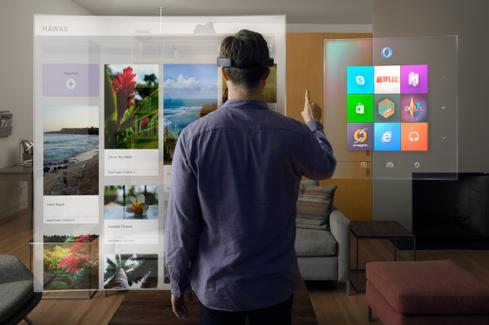Microsoft HoloLens Vs. Google Glass: No ComparisonMicrosoft HoloLens Vs. Google Glass: No Comparison
Microsoft's HoloLens and Google Glass both are headsets. But with its ability to respond to wearers' voices, hands, and eyes, the HoloLens has a brighter future.


Windows 10: 7 Pressing Questions For Microsoft
Windows 10: 7 Pressing Questions For Microsoft (Click image for larger view and slideshow.)
Microsoft's HoloLens made a splashy debut at last week's Windows 10 press conference. Observing the wireless demonstration of Windows Holographic was akin to watching a science fiction movie, as its wearer created a model UFO by shifting images around in midair.
Skeptics in the tech world, especially those watching the ever-growing wearables space, acknowledged similarities between the HoloLens and Google Glass, which was recently pulled from the market as Google shut down its Explorer program to further refine its approach to connected eyewear for the consumer audience.
Brian Blau, research director of consumer technology and markets at Gartner, has experience working in the virtual reality space and claims it's "a bit unfair" to compare Google Glass to Microsoft's holographic headgear. Sure, they're similar in the sense that they're both head-mounted displays, but it seems that Microsoft is trying to go down a different road.
"Out of all the head-mounted displays that I've tried in the past couple of decades, the HoloLens was the best in its class," Blau said. "There's a lot of promise for this kind of technology. It's odd to think about, in terms of wearing such an intimate device, but it can provide a lot of very rich information."
HoloLens could be categorized as a virtual reality (VR) device, as well as an augmented reality (AR) product like Google Glass. It's easy to see how Microsoft's product is more advanced. Its headset recognizes the wearer's vocal communication, eye movement, and hand gestures to help facilitate interaction between the virtual world and the real world.
While HoloLens is designed to project images in midair and on surrounding objects, Glass was designed to perform the functions of a smartphone. Like a phone, Glass could support apps, provide directions, take photos and videos, and perform Internet searches. It didn't offer much functionality that a smartphone doesn't, and as a result consumers perceived Glass as a redundant, more expensive version of their handheld devices.
There is a perception issue with Glass, says Blau.
Google was challenged to appeal to a mass consumer market that perceived its eyewear as high-end wearable technology lacking practical everyday applicability. Its camera, which was considered intrusive, did not help its image. Although Glass's social stigma will fade with time, people aren't yet ready to use such advanced technology for day-to-day tasks, says Blau.
HoloLens, in contrast, seems to have been designed with the enterprise in mind.
"Fundamentally, this type of immersive technology is going to be useful in many different types of businesses," says Blau. Applicability ranges from corporate training to hands-free work environments and remote communication. Although HoloLens also could be used for gaming, personal entertainment, and communication, the implications for business are greater.
[Windows 10: 7 Questions we have for Microsoft]
It's unlikely that Windows Holographic will face the same social stigma that Google Glass did. Right now, Microsoft appears to be focusing more on business-related functionality and gaming with its new creation. It isn't marketing holographic technology as something people will wear in daily life -- nobody will be concerned that a HoloLens is recording him in the local coffee shop.
That isn't to say that security won't be an issue with Windows Holographic. Privacy concerns will arise in time, says Blau, and security will prove a challenge as the HoloLens develops in the months to come.
"Did Microsoft look at the experience that Google had, and try to avoid that? Certainly," Blau notes, but right now the HoloLens is miles ahead of Glass. Will it stay ahead of the wearables game? Only time will tell.
Attend Interop Las Vegas, the leading independent technology conference and expo series designed to inspire, inform, and connect the world's IT community. In 2015, look for all new programs, networking opportunities, and classes that will help you set your organization’s IT action plan. It happens April 27 to May 1. Register with Discount Code MPOIWK for $200 off Total Access & Conference Passes.
About the Author
You May Also Like






